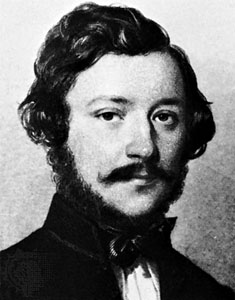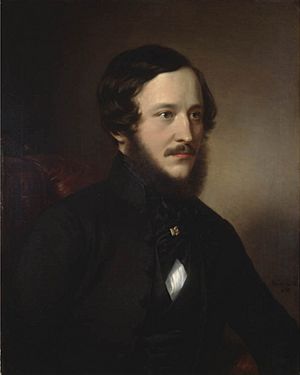József Eötvös facts for kids
Quick facts for kids
József Eötvös
|
|
|---|---|
 |
|
| Minister of Education of Hungary | |
| In office 7 April 1848 – 11 September 1848 |
|
| Preceded by | office created |
| Succeeded by | Lajos Batthyány |
| Minister of Religion and Education of Hungary | |
| In office 20 February 1867 – 2 February 1871 |
|
| Preceded by | Mihály Horváth |
| Succeeded by | József Szlávy |
| Personal details | |
| Born | 3 September 1813 Buda, Austrian Empire |
| Died | 2 February 1871 (aged 57) Pest, Austria-Hungary |
| Political party | Opposition Party, Centralists, Deák Party |
| Profession | politician, writer |
József baron Eötvös de Vásárosnamény (born September 3, 1813 – died February 2, 1871) was an important Hungarian writer and politician. He was born into a noble family. His name is sometimes spelled Joseph von Eotvos.
Eötvös played a big part in shaping Hungary during a time of major changes. He was known for his ideas about fairness and education. He worked to improve his country through both his writings and his political actions.
Contents
Early Life and Education
József Eötvös was born in Buda, which was part of the Austrian Empire at the time. His family, the Eötvös de Vásárosnamény, was a well-known noble family in Hungary. His father was Baron Ignác Eötvös, who held important positions in the government.
József received an excellent education. He also spent several years traveling across western Europe. During his travels, he learned about new ideas in literature and politics. He met many important thinkers of the Romantic movement.
Political Career
When Eötvös returned to Hungary, he began to share his progressive ideas. He wrote his first political book, Prison Reform. He also gave powerful speeches at the Hungarian parliament, called the diet.
Advocating for Change
In 1841, Eötvös strongly supported the idea of Jewish emancipation. This meant giving Jewish people equal rights. He believed in fairness for all citizens. He also wrote for a newspaper called Pesti Hírlap, sharing his thoughts on how to improve society.
His novels, like The Village Notary (1844–1846), also spread his ideas. This book became a classic in Hungarian literature. It showed the problems in Hungarian society at the time.
Role in the 1848 Revolution
The Hungarian Revolution of 1848 was a major event where many of Eötvös's ideas became popular. He became the Minister of Public Worship and Instruction in the first Hungarian government.
He worked alongside other important leaders like Ferenc Deák and István Széchenyi. They tried to bring peaceful changes to the country. When the prime minister resigned, Eötvös moved to Munich for a while. However, he continued to write and influence events from afar.
Return to Government
After returning home in 1851, Eötvös stayed out of politics for some time. He later became a close supporter of Ferenc Deák. In 1867, he once again became the Minister of Public Worship and Education. He was the only minister from the 1848 government to return to office.
This gave him the chance to put his lifelong ideas into action. In the same year, a law was passed to give Jewish people full rights. He also worked hard to bring more religious freedom, though this was more difficult.
Perhaps his greatest achievement was the National Schools Act. This law created a complete system for public education in Hungary. It was a huge step forward for schooling in the country. In 1866, he was also chosen to be the president of the Hungarian Academy of Sciences.
József Eötvös died in Pest on February 2, 1871. A statue was built in his honor in Pest in 1879.
Literary Works
Eötvös is also very important in Hungarian literature. While he wrote some poems, he is best known for his novels. When he wrote The Carthusians in 1838, Hungarian novels were still quite new.
Eötvös helped modernize Hungarian novels. He focused on current social problems and political goals in his stories. His famous book The Village Notary showed real-life issues. Another novel, Hungary in 1514, explained how the problems of the Hungarian nobility led to a big national disaster.
His collected works were published in 17 volumes in 1891. Some of his books have been translated into other languages, like English and German.
Family
- Loránd Eötvös was József Eötvös's son. Loránd became a famous physicist.
See also
 In Spanish: József Eötvös para niños
In Spanish: József Eötvös para niños
 | Laphonza Butler |
 | Daisy Bates |
 | Elizabeth Piper Ensley |


